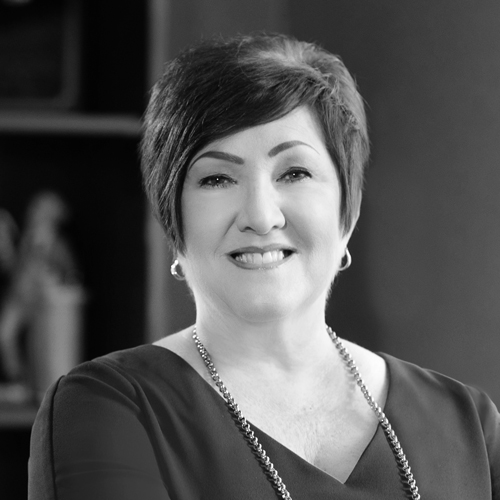About one hundred years ago, Panasonic introduced an improved attachment plug, a revolutionary conductor at the time that magnified the convenience of at-home electricity. Ever since then, the global electronics company headquartered in Japan has continued to innovate. From the introduction of the first three-tube radio in 1931 to color televisions in the early 1960s to plasma displays, there is little in the tech world that Panasonic hasn’t directly influenced.
Now, Panasonic is on the verge of the next frontier in innovation, but not by the traditional means—television, audio equipment—that consumers would expect. Instead, Panasonic’s leadership is setting their sights on higher-margin products, such as electric vehicle batteries, battery storage, photovoltaic cells, high-end cold storage, remote monitoring, and even smart cities.

“We are going to continue to innovate,” says Elizabeth Sanders, chief counsel—transactions, mergers and acquisitions (M&A) for Panasonic Corporation of North America. “We are moving into the next one hundred years as a tech innovation company, so we’re going to be looking to increase our presence in disruptive technology, including the internet of things (IoT), artificial intelligence, data, and predictive analytics.”
Sanders has been integral to Panasonic’s new strategy, particularly when it comes to the M&A function resulting in expansions into new territories. In 2017, Panasonic acquired California-based Arimo Inc., a leader in deep learning and behavioral AI. Through the acquisition, Panasonic was able to use Arimo’s data science expertise in solutions it provides to its business-to-business customers. It also helped Panasonic accelerate the growth of its AI and IoT-based solution business to further promote a digital transformation.
Another major acquisition for Panasonic came when it purchased Hussmann, a US-based refrigeration firm, which was a major opportunity for Panasonic entering the US food distribution industry and further expanded the company’s portfolio in the business-to-business sector.
“This deal was transformative for Panasonic,” Sanders says. “Panasonic, being in a time of great change, is scaling back consumer products and moving into products and services for corporate and government customers, so more B2B than the consumer electronics era. Hussmann was a huge part of that. It was a very important move for the company.”
But before Sanders joined Panasonic Corporation of North America in 2014, the company had not engaged in much M&A activity in the United States. Once recruited, not only did Sanders have to introduce a new function to Panasonic, but she also had to educate all departments about the value of M&A.
“We did a few relatively small acquisitions in businesses that were complementary to lines we were already in, particularly in the LED screens area,” Sanders says. “The way to build out that function is to connect with our team heads and the different disciplines and different specialties. You have to connect with the business leadership team to understand what their goals are, what success looks like, and then you connect with everyone from the human resources department to tax, IT, finance, intellectual property, and real estate. When issues arise, you really have to help train people in real time as you go forward to understand what the terms should be in the agreements.”
M&A is among the most complex legal fields, especially when it comes to large corporations, such as Panasonic. As a result, communication is vital between departments. “One of the things that sometimes happens is that people don’t get full information, or they don’t have a chance to think about the issues appropriately,” explains Alexei Cowett, partner for Venable LLP. “Ensuring that the team is well informed provides input and understanding, which is really important because if you don’t have that, then people are left out of the loop.”
Venable works with Panasonic on a variety of M&A matters, and Cowett has been working with Sanders for the past two years. He says it’s this type of transparency and communication from Sanders that has been instrumental in reducing complexity surrounding M&A matters.
“Liz is incredibly good at what she does, and she not only manages the project from the legal perspective, but she also has a great business sense as well,” he says. “She views herself as a business person at Panasonic who is responsible for managing the legal function on projects.”
Sanders has always been drawn to the legal field of M&A because it allows her to be a generalist and involved in a variety of business functions. In fact, in her fourteen years with Siemens Corporation prior to joining Panasonic, she oversaw a variety of acquisitions that ranged from $5 million to $100 million to massive global deals. Even though Siemens encompasses a variety of industries that vary from Panasonic, Sanders says the issues surrounding M&A are similar.
“You need to go through due diligence and to the extent that if it’s not adequate or you feel like there are things missing, then you need to look to the contract to ensure that you are protecting the interests of the company by including adequate reps and warranties and indemnification provisions,” she says.
One of the factors that drew Sanders to Panasonic, she says, was CEO Kazuhiro Tsuga’s willingness to create change when it’s uncomfortable. In today’s digital-first world, all tech companies are seeking the next way to disrupt the industry, which Panasonic has been at the forefront of, especially when it may be uncomfortable for a team’s leadership to voyage into the unknown.
“If you find it uncomfortable, get used to it. I think that’s good advice for everybody,” Sanders says. “The way that we do things is changing so rapidly. If you think about transportation, automated vehicles, electric vehicles—so much of it is disruptive technology.”
Now, with an impressive portfolio of companies through M&A that includes security solutions and satellite communication services, Panasonic is on the verge of that next frontier with smart cities through its CityNow project, which incorporates connected cars and roads and helps reduce energy consumption.
The concept was first initiated for Fujisawa, Japan, for about one thousand households. The city is planned around energy, security, mobility, and wellness. It also features EV charging stations, security systems, and smart home technology. By connecting the entire city, the goal is to reduce water consumption by 30 percent and reduce carbon dioxide levels by roughly 70 percent.
The same is now taking place in the United States in Colorado Springs, Colorado. When the city and Colorado Springs Utilities launched a smart city initiative, they turned to Panasonic for helping with the city’s needs. With Panasonic’s portfolio, Colorado Springs is starting to use technology in conjunction with IoT to help improve quality of life for citizens.
For Panasonic, this voyage is a continuing path to disrupting the industry, just as it has been since its founding in 1918. “The natural transition for Panasonic is to lead the way with growth for the next one hundred years,” Sanders says.
“Panasonic is a company that is doing some great things, and Liz is helping them do that,” Cowett adds.
Photo: Rod Goodman
The Critical Importance of Diversity
Outside of mergers and acquisitions and further developing Panasonic’s new portfolio, the company puts a critical importance on diversity. As Elizabeth Sanders explains, there are several programs currently taking place, including internships with area schools in Newark, New Jersey, which is the site of Panasonic’s North America headquarters.
“In our hiring and in our internships, we are always looking to maximize diversity because we believe that diversity of thought increases performance and engagement and makes us more reflective of the community in which we reside,” Sanders says. “For me being a senior woman in the practice of M&A, I continue to be one of the only women in the room, which is actually surprising because after all this time I would have thought that it might have changed. But it hasn’t really changed as much as I would have expected. I am keenly aware that we need to be focused on diversity of thought in order to create opportunities and also be genuine members or our community here in Newark.”
As a mother of two, promoting women in leadership positions is also especially important for Sanders. She is part of Women Connect at Panasonic, which encourages women to pursue leadership opportunities and also offers advice for helping to achieve a work/life balance.
“To younger women who are just having children, I like to say stick with it, because I think in the end it’s worth it,” Sanders says. “You have your career. You have this thing that’s yours. You worked for it. It means something to you. I really encourage women to not give up on that, and my husband is extremely supportive of my career.”

